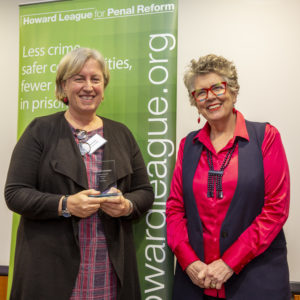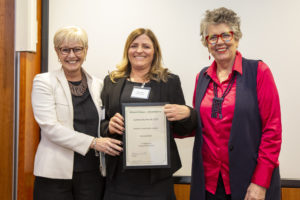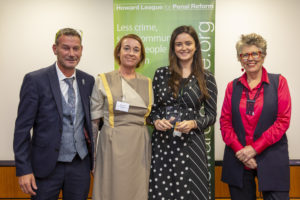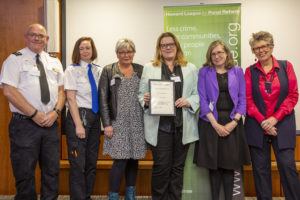2019 Community Awards Winners
The Howard League Community Awards were presented at the national conference on 12 November 2019 by Prue Leith, chef, author and broadcaster.
Winners and Commendations by category
Organisation of the Year
Winner

C2C Social Action
C2C Social Action is a charity in Northamptonshire, working with offenders and those at risk of offending. Whilst their support is accessible to young people, men and women at any stage in the criminal justice system, most of their current services are for women and they run Northamptonshire’s Women’s Centre. C2C help women with life issues including homelessness and accommodation; education, training and employment; health, especially mental health; addictions; finance, debt and benefits; family relationships; attitudes, thinking and behaviour; prostitution; domestic abuse; loneliness and isolation.
They deliver community orders for Probation Services as an alternative to custodial sentences, giving women a chance to address real life issues in order to reduce re-offending. These orders include Rehabilitative Activity Requirements, Mental Health Treatment Requirements and Community Payback Orders.
C2C support women in HMP Peterborough being released to Northamptonshire. They run gender-specific trauma-informed courses for women to explore all aspects of trauma, abuse and relationships, and to empower them.
They provide support in shared houses. Their team work closely with occupants to develop their skills, knowledge and confidence to maintain accommodation and live a structured, crime-free lifestyle. Motivated by Christian commitment, their charity provides relational, person-centred, practical and inclusive support to all.
Commendation
The Aurora Project
The Aurora Project is the first of its kind in the UK offering free group and individual therapy to both male and female adults who need support with certain sexual thoughts they are having. Those who seek support from the Aurora Project may not have any desire to act upon their sexual thoughts but may want support in how to manage them. They currently offer support to anyone who is able to get to Nottingham. However, 1-1 support can be offered throughout the UK where they have therapists available. They utilise Compassion Focussed (CFT) and Acceptance and Commitment Therapy (ACT) within both the group and individual work and tailor the work to the client’s treatment needs which are identified in collaboration with them and reviewed regularly. Currently they have 42 referrals, 7 1-1 cases and 10 group members with a waiting list of 4. They have had 2 people complete the programme to date. Their programme is grounded in current research and is being evaluated by our PhD student from Nottingham Trent University. They work collaboratively with other organisations within The Midlands and offer ongoing CPD on understanding sexual risk and the aims of the project.
Criminal Justice Champion
Lifetime Achievement Award
Baroness Jean Corston
In 2007, Baroness Corston published her seminal report – ‘A review of women with particular vulnerabilities in the Criminal Justice System’ as an international blueprint for how women in the justice system should be treated. She has worked tirelessly since then on issues such as stopping strip search, investing in women’s centres and stopping building of more women’s prisons. In addition to arguing the case in the Lords and promoting the issues with Parliamentarians and others including Police and Crime Commissioners, Baroness Corston has led with the Howard League on driving forward the work of the All Party Parliamentary Group on women. She has also personally supported specialist charities working in this space, including Working Chance and Women in Prison. What sets Baroness Corston apart from any others doing similar work is her connection with and understanding of those whose stories she based her report on, which is so powerful and quite unique. Many women in prisons know Baroness Corston’s name and feel great affection for her and the work she does. If the Government’s Strategy on female offending is delivered as many of us are absolutely determined that it will, the one person who it would not have been possible without is Baroness Corston. She is a champion for criminal justice, women’s services and the possibility of real change to the broken system – her passion, empathy and tireless commitment to justice is an example to Parliamentarians and all of us.
Unsung Hero

Julie Parsons
Julie spent 30 years fighting crime and preventing re-offending. She competently used early intervention, preventative and restorative approaches in diverting offenders from crime. Julie introduced restorative justice to charitable work at C2C. She set up C2C Social Action in 2003, a charity aimed at preventing offending, and reducing re-offending. Julie as Founder and Chair has worked tirelessly on a voluntary basis. Because of her expert leadership, the charity successfully provides a women’s centre that holistically helps women overcome life controlling issues, all in one space. The charity has helped many women divert from crime and make good life choices. C2C now is a flag-ship centre for Mental Health Treatment Requirement orders.
Julie oversaw C2C setting up a very successful social enterprise bakery, “The Good Loaf”. The charity also has three houses where vulnerable people are offered accommodation and help in accessing appropriate services. There are also plans to provide a safe shelter for homeless women.
Julie continues to be active in other community initiatives. She has just written the countywide ROC homelessness strategy which all the local voluntary member organizations are signing up to. ROC is engaging with statutory services to seek improvements, justice and to develop best practice.
Restorative approaches
Winner

Restorative Cleveland
Safe in Tees Valley
Restorative Cleveland forms part of Safe in Tees Valley; commissioned by the Cleveland Office of the Police & Crime Commissioner (OPCC). Support can be accessed at various points during an individual’s journey throughout the Criminal Justice System (CJS); enabling broader opportunities to positively shape recovery, affect change and address the harm caused by crime. Referrals are welcomed from both victim and offender-initiated sources, with the focus of all work undertaken being victim-led. The team comprises of four practitioners; including a Service Manager, Deputy Manager, Seconded Community Rehabilitation Company (CRC) Restorative Justice (RJ) Practitioner and a Police RJ Coordinator. Co-location with the Victim Care & Advice Service (VCAS), enables Restorative Cleveland to offer a more integrated and coordinated model of victim care, safeguarding and informed offender risk-management. Liaison with local partners aims to divert individuals from the CJS, offering an alternative means of addressing offending behaviour and supporting those affected by crime. The Police RJ Coordinator develops referral pathways within Cleveland Police, to better promote the use of restorative approaches and victim-focused intervention. This work includes the quality assurance of Community Resolutions, providing an opportunity for officers to use professional judgement in dealing with low-level crime and anti-social behaviour.
Commendation

Children First
Prospects, part of Shaw Trust
The Children First Diversion Scheme was introduced in Gloucestershire in January 2018; the objectives are early intervention, practical and effective partnership working, information sharing, and the progressive replacement of criminalising sanctions with restorative practice approaches. They recognise that children who offend, very often, are themselves vulnerable young people where traditional criminalising sanctions are both ineffective and inappropriate. The police defer charging decisions or decisions to initiate youth cautions or youth conditional cautions to a weekly Joint Decision-making Panel (JDP) consisting of Police Sergeants, Youth Support Team Managers and a NHS Mental Health nurse. The JDP access information from across the partnership, in order to make informed decisions and aim to dispose of most cases through a Youth Restorative Intervention (YRI), which puts victims at the heart of the intervention, which is delivered by the Youth Support Team. Since the scheme was introduced there has been a significant reduction in first time entrants. There were 40 FTE’s in the county in 2018; which is considerably lower than the previous two years which were 135 and 161 respectively. Reoffending rates within the first year were 13.5%, which is considerably lower than for statutory court orders.
Policing and children
Winner

CATCH (Community Action To Create Hope)
CATCH Leeds
CATCH stands for ‘Community Action To Create Hope’, a registered charity based in Leeds, West Yorkshire founded by Police Officer, Ash Razzaq MBE in 2009.
CATCH aims to:
- Create positive futures for children and young people through a variety of programmes.
- Develop safe spaces within communities.
- Provide innovative volunteering and social action opportunities, where young people are empowered to create positive change in their own communities.
- Work in partnership with public, private, education and third sector organisations to make a greater impact towards community safety through collaborative projects.
- Promote togetherness, unity and acceptance.
CATCH is based on a site which was previously plagued by anti-social behaviour and crime. Through a multi-sector and community led approach, the site has been transformed into a much-needed resource consisting of a multi-functional community centre, gym, café, sports field and educational animal farm.
CATCH is run by passionate volunteers who come from a range of backgrounds and age groups. Their digital Volunteer Development Programme, ‘Super Stars’ is particularly unique, as it actively encourages young people from the age of 11 to volunteer. This enables them to become a productive part of society whilst gaining specific employment and life skills. Many of the young people engaged at CATCH are vulnerable to negative influences or have previously been involved in criminality and have now turned their lives around.
Commendation

Stay Curious!
The Children Society and Met Detention
Stay Curious! is a partnership between the Children’s Society (TCS) and Met Detention. Police custody has emerged through TCS’ work as a key opportunity for child exploitation to be identified and disrupted. Met Detention have also been exploring new ways to support and safeguard children in custody. They came together in October 2018 to begin working on this.
Over the last year, they have worked collaboratively on a number of initiatives. TCS delivered interactive case study training to all 1000+ custody staff. Some feedback from participants about how they will apply what they learnt from the training:
- “A greater determination to try to break down the initial barriers and establish a relationship with child detainees”
- “Building a rapport with young children in custody and thinking outside the box about their needs and life after custody”
Met Detention have been developing new responses when a child first comes into custody and are currently undergoing a four-month information-sharing pilot in one of London’s busiest custody suites, supported by TCS. Met Detention also ran specialist youth custody suite during the Notting Hill Carnival for the second year running and TCS provided trained appropriate adults to support children at the suite.
Liaison and diversion
Winner

Amber PCC Beds
The Amber Foundation
The Amber Foundation provides a safe temporary place to live for young people who are homeless or at risk of homelessness. Many of the young people who stay with Amber have various issues relating to substance abuse, mental ill-health and 66% of them have a criminal conviction. Once homeless, it is very difficult to break the cycle of homelessness and offending making it almost impossible to move into employment or education. Whilst at their residential centre in Surrey, Amber work with the individuals to try and transform their lives. Ultimately, the aim is to move the young people back into mainstream society by working with them so that they can find employment, education and training and independent accommodation.
Commendation

The Bedfordshire Mental Health Treatment Requirement (MHTR) Project
East London Foundation Trust
The Bedfordshire MHTR project is an inspirational piece of work between many partners which began operating in October 2018, and 26 women have received treatment requirements (avoiding 13 years of custody). Led by a regional commissioning team (not one of the five ‘test bed’ sites), it has close working between probation, the courts, NHS England, the mental health service and third sector partners to allow diversion from custody for relevant offences. People receiving an MHTR are less likely to re-offend than those who receive a custodial sentence.
The project partners have had many meetings and communications with schemes in Northants and Milton Keynes, because people move between these areas. A workshop for the three projects had its opening address from a Bedfordshire service user who has had an MHTR under this project. With others, she will provide insights to the steering group as it develops the service.NHS England has commissioned the University of Northampton to undertake a study of the pilot, and the researcher is a member of the steering group, ensuring data collection is robust. The group’s future plans include developing the service for men who could benefit from a MHTR.
Women
Winner

LINC (Local Initiatives Nurturing Change)
Willowdene Rehabilitation
LINC is a co-commissioned whole system approach across Warwickshire and West Mercia which delivers tailored support to divert women at risk of offending away from the criminal justice system. It coordinates a multi-agency service with 25 partner agencies who can refer into or offer interventions. Women can also self-refer.
Women are allocated a LINC worker and are supported to develop and own a Care and Recovery Plan (CARP) based on a structured assessment of their offending related needs for an initial 12-week period, alongside the use of Justice Outcome Star. Women can view their circumstances and targets both pictorially and in written form, with regular reviews.The project approach is to connect and support them meaningfully using local resources and their own recovery capital. The CARP acts as a single assessment to sequence entry to other services and workers attend initial appointments with women to access interventions and empower them to address practical needs.
A direct pathway enables workers to refer women to individual and group-based interventions and qualifications with RITE Social Enterprises. To overcome rurality women are transported to and from the training centre where they also participate in counselling, fitness sessions, and employer led training.
Commendation

C2C Women’s Centre
C2C Social Action
C2C Women’s Centre provides a safe space for women to meet. They offer trauma informed gender specific provision for women at the earliest possible stage to divert them from and keep them out of the criminal justice system. This has a huge impact on their lives, their children, wider families & local communities creating a safer, stronger Northamptonshire.
They have a support worker based in court every morning to meet the women listed that day and this is often our first contact with many women who are on the fringes of the criminal justice system. Women hear about the support that is available at the women’s centre and regardless of whether they receive a community order or not they are encouraged to use the facilities and support available. C2C’s support workers work with them in a holistic way to support with practical things such as housing, relationships, benefits, getting work and appointments with various agencies. By working in a person-centered way, valuing the individual, C2C is reducing short term prison sentences being handed out to women in Northamptonshire and is providing support to the women to address their social and economic needs alongside their mental and physical health needs.
Policing and adults
Winner

POLIT (Police Online Investigation Team) Pathway
West Yorkshire Liaison and Diversion
West Yorkshire Liaison and Diversion Service (L&D) have developed a specific pathway for those individuals arrested for downloading indecent images of children (IIOC). As result of Operation Notaries (2014), L&D have developed and established a referral pathway with The Police Online Investigation Team (POLIT). The findings from Operation Notaries highlighted that IIOC offenders are a highly vulnerable group at high risk of death by suicide. The pathway between West Yorkshire L&D and The POLIT provides support to the alleged perpetrator but also the police in managing both the self-harm/suicide risk of these suspects as well as reducing re-offending.
Each individual receives an individually tailored plan. A holistic assessment is completed to explore all possible contributing factors to their offending/well-being. L&D will refer and signpost into services relevant to support needs, taking into account individual vulnerabilities. This also includes liaising with health care professionals and providing emotional practical support due to relationship breakdowns with family and friends as a result of the offence. As part of this, L&D have also established a referral pathway with an organisation that supports in reducing/managing harmful and unhealthy sexual behaviours, whilst reducing the impact of crisis.
Commendation

DIVERT
Metropolitan Police
DIVERT is a Metropolitan Police service diversion programme. Working collaboratively with Bounce Back, The New Era Foundation, Millwall Community Trust and Palace for life they are working with young adults that come into police custody and look to find them employment, education and training. Their objective to reduce offending and prevent further crime.
So far, they have worked with over 800 people with half finding Employment, Education and training and we have maintained a rearrests rate of <10%. DIVERT is based in six custody suites across London and is funded by the Home Office. Over the next three months DIVERT will be implement in five policing areas outside of London and continue to change the culture of police custody of one not just of detention but one of opportunity.
Children in care
Commendation

North Lincolnshire Children in Care Partnership
Humberside Police and North Lincolnshire Council
In North Lincolnshire they have reviewed and updated their protocol when dealing with young people in our local registered Children’s Home – 2018 it was noticeable the calls for service to the Home had increased. Nationally a small number of looked after children and care leavers remained over-represented in the criminal justice system and we wanted to buck this trend.
A small working party of the Early Intervention Sergeant, the Youth Offending Service and the manager of the registered children’s home looked at reviewing and updating the joint protocol that would be put in place across the organisations to include Children’s Services.
Key areas followed the principles of early intervention in diverting first time entrants away from the Criminal justice system and to also include diverting those who have already entered the system away from further sanctions; and the unnecessary criminalisation of children in care and care leavers.
This has resulted in a marked reduction in offending behaviour, calls for service and provided stability including significant and improved family relationships. By working to this protocol, we have only seen one young person out of 11 young people within the Children’s home entering the justice system over the past 12 months.
Commendation

Together for Children
Sunderland Youth Offending Services and Northumbria Police
Since 2015 Together for Children, Sunderland Youth Offending Service and Northumbria Police have worked in partnership to develop, implement and deliver the Sunderland Joint Agency Protocol regarding offending in residential care.
The protocol is committed to reducing unnecessary criminalisation of young people’s behaviours in residential care, starting from the overriding principle that group living can be very challenging for teenagers. It sets out guidance to the YOS, children’s homes and police on ways to manage difficult behaviours without resorting to formal police sanctions, which previously resulted in Looked After children getting a criminal record.
Diversion Panels consider the circumstances of the offence, the voice of the child, wishes of the victim, the child’s Looked After placement and any wider concerns such as sexual/criminal exploitation.
The Panels then decide whether an internal/voluntary restorative justice approach can be adopted. Together for Children performance data shows that the amount of offending by children who have been Looked After continuously for at least 12 months has reduced from 16.1% in 2011/12 to 5.1% in 2017/18 following implementation of the Joint Agency Protocol. These excellent results show the significant and positive impact that the Joint Agency Protocol has achieved.
-
Join the Howard League
We are the world's oldest prison charity, bringing people together to advocate for change.
Join us and make your voice heard -
Support our work
We safeguard our independence and do not accept any funding from government.
Make a donation